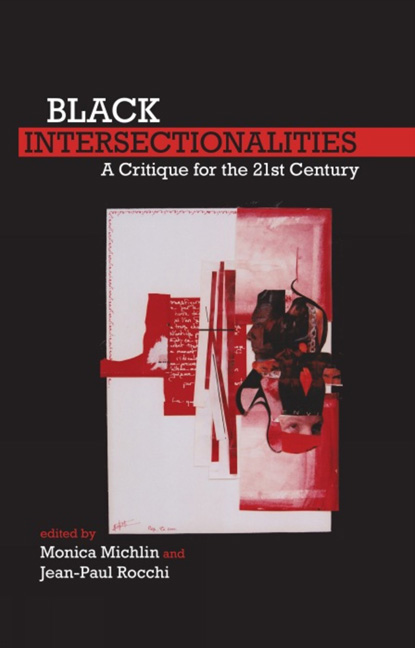Book contents
- Frontmatter
- Contents
- 1 Introduction: Theorizing for Change: Intersections, Transdisciplinarity, and Black Lived Experience
- 2 Exordium: Writing and the Relation: From Textual Coloniality to South African Black Consciousness
- I Challenging Hegemonic Gender Identities
- II Nonconformity and Narrative heorizing
- III Upsurges of Desire
- 9 “Risking Sensuality”: Toni Morrison's Erotics of Writing
- 10 Cultures of Melancholia: Theorizing Desire and the Black Body
- 11 Richard Wright's Poetics of Black Being: Metaphor, Desire, and Doing
- IV Epistemological Genealogies and Prospections
- Contributors
- Index
10 - Cultures of Melancholia: Theorizing Desire and the Black Body
from III - Upsurges of Desire
- Frontmatter
- Contents
- 1 Introduction: Theorizing for Change: Intersections, Transdisciplinarity, and Black Lived Experience
- 2 Exordium: Writing and the Relation: From Textual Coloniality to South African Black Consciousness
- I Challenging Hegemonic Gender Identities
- II Nonconformity and Narrative heorizing
- III Upsurges of Desire
- 9 “Risking Sensuality”: Toni Morrison's Erotics of Writing
- 10 Cultures of Melancholia: Theorizing Desire and the Black Body
- 11 Richard Wright's Poetics of Black Being: Metaphor, Desire, and Doing
- IV Epistemological Genealogies and Prospections
- Contributors
- Index
Summary
The theoretical concept of melancholia has recently received heightened critical attention in the field of race and postcolonial studies. As an emotional reaction to the denial of the loss of a loved object, be it a person, a place, or an ideal, melancholia gives shape to a “constellation of affect” or a “structure of feeling” encompassing the individual and the collective, the psychic and the social (Eng and Kazanjian, 2003: 3). As such, it has emerged as a crucial touchstone for subjective as well as political formations. In particular, melancholia has been deployed to unravel the complex mechanisms of national formation and racial identification.
In Postcolonial Melancholia, Paul Gilroy draws a rather grim picture of this passion which would lie in Europe's inability to mourn its loss of its empire, thus resulting in a process of historical amnesia. This is reflected, on the one hand, in the euphoric celebrations of the victories of a declining postcolonial regime and, on the other, in the hostility towards migrants who represent at the same time the reminder of pain for its loss and guilt for its violent management (2005: 102–17). This blending of omnipotence and guilt that constitutes the melancholia of the former colonizers is also explored in the context of American culture by Anne Cheng, who proposes a concept of racial melancholy as a process affecting both dominant and subordinate groups. According to Cheng, racial melancholia implies a double perspective. On the one hand, dominant white identity produces itself by projecting outside a lost racial other which is incorporated and rejected at the same time in order to legitimize white superiority; hence, the racist nation state swallows up the racial object, expelling what it cannot forget – colonialism, slavery, genocide – as it does not fit in its democratic ideology. On the other, formerly colonized subjects and ethnic minorities also run the risk of remaining suspended forever in the melancholic process of assimilation/ identification and expulsion/denial as they are forced to assimilate an impossible lost ideal of whiteness. Melancholy implies identification with the object towards which one feels resentment, in this case the colonizer; this internalization of the dominant ideal and its accompanying denigration is the work of racial melancholia for the raced subject (2000: 9–11). Thus, if white melancholia is based on a process of amnesia and repression, black melancholia is based on a process of introjected racism.
- Type
- Chapter
- Information
- Black IntersectionalitiesA Critique for the 21st Century, pp. 145 - 157Publisher: Liverpool University PressPrint publication year: 2013



